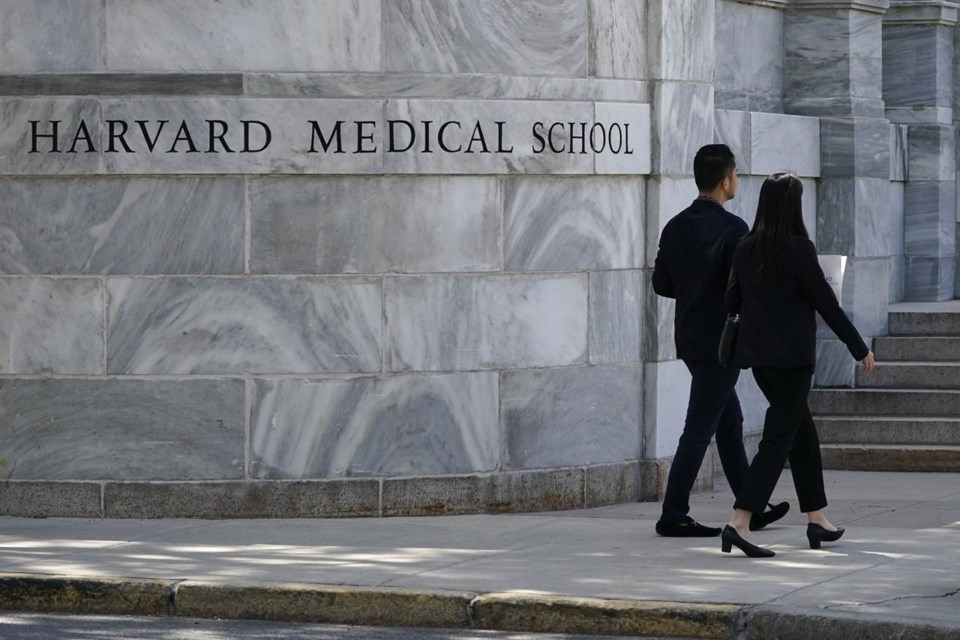CAMBRIDGE, Mass. (AP) ŌĆö A lawyer for families that sued Harvard Medical School for negligence over the theft of body parts of their loved ones from its morgue pledged to appeal Tuesday after a judge in Boston dismissed the lawsuits.
Suffolk County Superior Court Judge Kenneth Salinger said the lawsuits from donorsŌĆÖ families failed to show Harvard was responsible for the conduct of its morgue manager, accused of the alleged thefts.
Kathryn Barnett, a lawyer representing families, said they aren't done fighting in the courts. Forty-seven relatives of people who donated their bodies which were consolidated, she said.
ŌĆ£We are profoundly disappointed with this decision, but it is not the final word on our efforts to prevent Harvard from shirking its responsibility,ŌĆØ she said. ŌĆ£We will appeal.ŌĆØ
A spokesperson for Harvard said the school would not comment on the judgeŌĆÖs decision.
Barnett faulted Salinger's ruling, saying he too readily accepted Harvard's argument that they acted in good faith and shouldn't be held responsible.
ŌĆ£If youŌĆÖre an institution and want to accept bodies for science, you could just hire someone, give him the keys to the morgue, send him to a dark corner of the campus and never check up on him,ŌĆØ she said. ŌĆ£That can't be the law.ŌĆØ
Barnett said the families support the donation of bodies for science but believe institutions that accept bodies need to do more to ensure they are being handled properly.
In his decision, Salinger pointed to what he called Harvard's qualified immunity under the state's version of the Uniform Anatomical Gift Act.
ŌĆ£The factual allegations in the complaints do not plausibly suggest that these Harvard Defendants failed to act in good faith in receiving and handling the donated bodies,ŌĆØ Salinger wrote.
Jennie DunKley of Easton, Massachusetts is one of the family members suing Harvard. Her husband, a retired New York City police sergeant, died in 2018 of cancer at age 67 and donated his body.
DunKley said Harvard's refusal to take full responsibility has done more to desecrate the donation process than those who allegedly stole body parts.
ŌĆ£I canŌĆÖt speak to the law but the fact that Harvard is fighting this to begin with and refusing to accept responsibility obliterates the sanctify and fidelity of the process so people wonŌĆÖt be willing to give,ŌĆØ said DunKley, 66, a special education consultant.
The former morgue manager, Cedric Lodge of Goffstown, New Hampshire that were donated to the medical school in the scheme that stretched from 2018 to early 2023. The body parts were taken without the schoolŌĆÖs knowledge or permission, authorities have said.
Lodge, his wife and others are facing federal criminal charges. Both Lodge and his wife have pleaded not guilty.
Harvard said Lodge was fired May 6.
According to prosecutors, the defendants were part of who bought and sold remains stolen from Harvard Medical School and an Arkansas mortuary.
Lodge sometimes took the body parts ŌĆö which included heads, brains, skin and bones ŌĆö back to his Goffstown, New Hampshire, home, and some remains were sent to buyers through the mail, according to the criminal case. Lodge also allegedly allowed buyers to come to the morgue to pick which remains they wanted to buy, authorities said.
Bodies donated to Harvard Medical School are intended for use for education, teaching or research purposes. Once they are no longer needed, the cadavers are usually cremated and the ashes are returned to the donorŌĆÖs family or buried in a cemetery.
Steve Leblanc, The Associated Press


